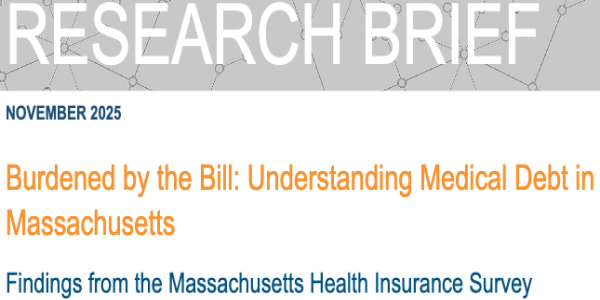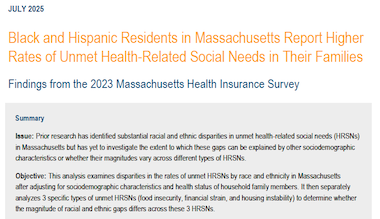Massachusetts Health Insurance Survey
Massachusetts
Health Insurance Survey
The 2025 Massachusetts Health Insurance Survey (MHIS)
(Published December 2025)
The Massachusetts Health Insurance Survey (MHIS) provides information on health care coverage, access, use, and affordability trends in the Commonwealth as part of CHIA’s Continuing Study on Insurance Coverage, Underinsurance, and Uninsurance.
The MHIS is used by CHIA as well as by legislators, policymakers, employers, insurers, and other stakeholders to track the experiences of Massachusetts residents in obtaining timely and affordable health care. While national data sources can help monitor some of these health care metrics, this survey enables the tracking of issues specific to Massachusetts.
The 2025 survey was fielded from January through April 2025 and was funded in part by a grant from the Blue Cross Blue Shield of Massachusetts Foundation. It includes new questions on behavioral health care, tax-advantaged health saving and spending accounts (such as HSAs and FSAs), and administrative burden impacting access to care, along with refinements to questions about medical debt and difficulties accessing care to capture recent changes in the health care landscape.
2025 MHIS Key Findings
- Nearly all Massachusetts residents—97.9 percent—reported having insurance. Uninsured residents were disproportionately adults ages 19 to 64, male, Hispanic, or in a household with a family income below 300 percent of the federal poverty level.
- Although 9 out of 10 residents reported having a primary care provider, more than 30 percent of residents reported difficulties accessing primary care.
- Two out of 5 residents reported that they or their families had health care affordability issues, a burden that is greater for Hispanic and Black residents as well as those with a family income less than 400 percent of the federal poverty level.
- Nearly half of commercially insured Massachusetts residents reported having a high-deductible health plan (HDHP).
- Among the 1 in 5 residents who reported a visit for behavioral health care, 17.2 percent reported paying for their appointment entirely out of pocket. Residents paying entirely out of pocket most often did so because their provider didn’t accept any health insurance or didn’t accept their insurance plan.
Updated December 11, 2025
Burdened by the Bill: Understanding Medical Debt in Massachusetts
(Published November 2025)
Burdened by the Bill: Understanding Medical Debt in Massachusetts explores family medical debt in Massachusetts. Findings show that cost-sharing—especially deductibles—is the most common source of medical debt in the Commonwealth.
Despite near-universal health insurance coverage, more than 1 in 8 Massachusetts residents carries family medical debt. Medical debt poses a persistent affordability challenge and is associated with a wide range of negative consequences, from forgoing medical care to facing food insecurity and housing instability.
This research brief combines data from both the 2021 and 2023 Massachusetts Health Insurance Surveys.
Findings are broken out by sociodemographic characteristics like race and income level.
Black and Hispanic Residents in Massachusetts Report Higher Rates of Unmet Health-Related Social Needs in Their Families
(Published July 2025)
CHIA has published a research brief examining disparities in the rates of unmet health-related social needs (HRSNs) by race/ethnicity in Massachusetts. Findings show that compared with White residents, Black and Hispanic residents experienced any unmet HRSN more than twice as often even after adjusting for other sociodemographic factors.
Black and Hispanic Residents in Massachusetts Report Higher Rates of Unmet Health-Related Social Needs in Their Families utilizes data from the 2023 MHIS. Additional key findings show that Black and Hispanic residents were:
- Three times as likely to experience food insecurity
- Twice as likely to report financial strain
- Nearly three times as likely to experience housing instability
Racial and ethnic disparities in the rates of unmet HRSNs may contribute to inequities in health care access, utilization, and affordability for Massachusetts residents. These findings can inform targeted policy interventions by focusing on the communities experiencing the highest rates of unmet HRSNs and addressing specific HRSNs, such as food insecurity and housing instability, to improve health outcomes in the Commonwealth.


